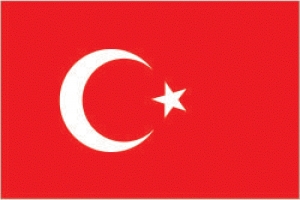Turkey
The Republic of Turkey, straddles Europe and Asia at the northeast end of the Mediterranean Sea. To the north is the Black Sea and to the west is the Aegean Sea. Turkey has many neighbors from Europe and Asia. Greece and Bulgaria are to the west, Russia, Ukraine, and Romania, through the Black Sea, are to the north and northwest, Georgia, Armenia, Azerbaijan, and Iran lie in the east while the south features Syria and Iraq. The country is divided by Dardanelles, the Sea of Marmara, and the Bosporus.
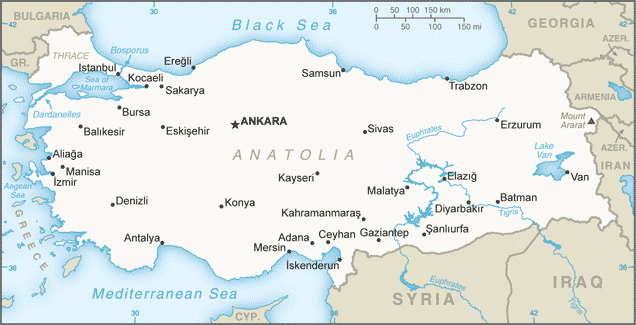
Turkey is a mostly mountainous area with narrow coastal plains and a treeless central plateau. Climate is temperate with hot and dry summers while winters are mild and wet. Interior weather, though, is harsher. Turkey’s land borders are 2,627 kilometers long in total. Its coastline is 7,200 kilometers. Area: 780,580 sq km, of which 770,760 sq km is land and 9,820 sq km is water. Population is around 75 million. Turkish people comprise 80% of the population with the rest being Kurdish. The official language is Turkish. Kurdish, Dimli, Azeri and Kabardian are also spoken.
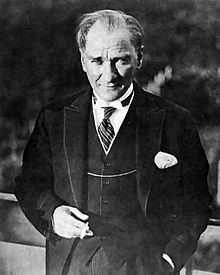
Mustafa Kemal Ataturk, founder of the Republic of Turkey
Turkey was formed in 1923 from what remained of the Ottoman Empire, which ruled for around 600 years.so, Modern Turkey was founded in 1923 from the Anatolian remnants of the defeated Ottoman Empire by national hero Mustafa KEMAL, who was later honored with the title Ataturk or "Father of the Turks." Under his leadership, the country adopted wide-ranging social, legal, and political reforms. After a period of one-party rule, an experiment with multi-party politics led to the 1950 election victory of the opposition Democratic Party and the peaceful transfer of power. Since then, Turkish political parties have multiplied, but democracy has been fractured by periods of instability and intermittent military coups (1960, 1971, 1980), which in each case eventually resulted in a return of political power to civilians. In 1997, the military again helped engineer the ouster - popularly dubbed a "post-modern coup" - of the then Islamic-oriented government. Turkey intervened militarily on Cyprus in 1974 to prevent a Greek takeover of the island and has since acted as patron state to the "Turkish Republic of Northern Cyprus," which only Turkey recognizes. A separatist insurgency begun in 1984 by the Kurdistan Workers' Party (PKK) - now known as the Kurdistan People's Congress or Kongra-Gel (KGK) - has dominated the Turkish military's attention and claimed more than 30,000 lives. After the capture of the group's leader in 1999, the insurgents largely withdrew from Turkey mainly to northern Iraq. In 2013, KGK and the Turkish Government agreed to a ceasefire that continues despite slow progress in ongoing peace talks. Turkey joined the UN in 1945 and in 1952 it became a member of NATO. In 1964, Turkey became an associate member of the European Community. Over the past decade, it has undertaken many reforms to strengthen its democracy and economy; it began accession membership talks with the European Union in 2005.
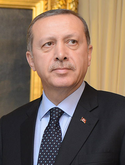
Rajab Tayyip Erdoğan
President
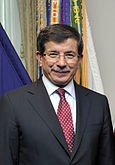
Ahmet Davutoğlu Prime Minister
Turkey is a parliamentary representative democracy. Since its foundation as a republic in 1923, Turkey has developed a strong tradition of secularism. Turkey's constitution governs the legal framework of the country. It sets out the main principles of government and establishes Turkey as a unitary centralized state. The President of the Republic is the head of state and has a largely ceremonial role. The president is elected for a five-year term by direct elections.
Executive power is exercised by the Prime Minister and the Council of Ministers which make up the government, while the legislative power is vested in the unicameral parliament, the Grand National Assembly of Turkey. The judiciary is independent of the executive and the legislature, and the Constitutional Court is charged with ruling on the conformity of laws and decrees with the constitution. The Council of State is the tribunal of last resort for administrative cases, and the High Court of Appeals for all others.
The prime minister is elected by the parliament through a vote of confidence in the government and is most often the head of the party having the most seats in parliament. The prime minister is Ahmet Davutoğlu who is also the leader of the Justice and Development Party (AKP) since 27 August 2014.
Universal suffrage for both sexes has been applied throughout Turkey since 1933, and every Turkish citizen who has turned 18 years of age has the right to vote. There are 550 members of parliament who are elected for a four-year term by a party-list proportional representation system from 85 electoral districts. The Constitutional Court can strip the public financing of political parties that it deems anti-secular or separatist, or ban their existence altogether. The electoral threshold is 10 percent of the votes. Supporters of Atatürk's reforms are called Kemalists, as distinguished from Islamists, representing two extremes on a continuum of beliefs about the proper role of religion in public life. The Kemalist position generally combines a kind of democracy with a laicist constitution and westernised secular lifestyle, while supporting state intervention in the economy, education, and other public services. Since the 1980s, a rise in income inequality and class distinction has given rise to Islamic populism, a movement that in theory supports obligation to authority, communal solidarity and social justice, though what that entails in practice is often contested.
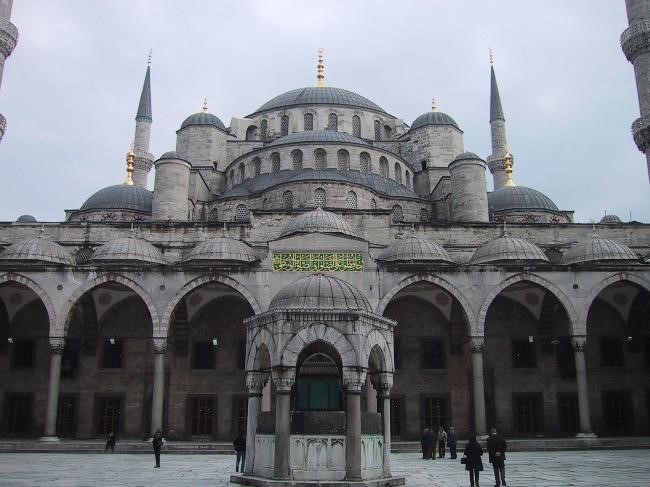
The Sultan Ahmed Mosque in Istanbul
Turkey is a secular state with no official state religion; the Turkish Constitution provides for freedom of religion and conscience. The role of religion has been a controversial debate over the years since the formation of Islamist parties. For many decades, the wearing of the hijab was banned in schools and government buildings because it was viewed as a symbol of political Islam. However, the ban was lifted from universities in 2011, from government buildings in 2013, and from schools in 2014.
Islam is the dominant religion of Turkey with 99.8 percent of the population being registered as Muslim. While some sources give a little lower estimate of 96.4 percent, with the most popular sect being the Hanafite school of Sunni Islam. The highest Islamic religious authority is the Presidency of Religious Affairs; it interprets the Hanafi School of law, and is responsible for regulating the operation of the country's 80,000 registered mosques and employing local and provincial imams. Academics suggest the Alevi population may be from 15 to 20 million, and according to Aksiyon magazine, the number of Shiite Twelvers (excluding Alevis) is 3 million (4.2 percent). There are also some Sufi Muslims. Roughly 2 percent are non-denominational Muslims.
The percentage of non-Muslims in Turkey fell from 19 percent in 1914 to 2.5 percent in 1927, due to events which had a significant impact on the country's demographic structure, such as the Armenian Genocide, the population exchange between Greece and Turkey, and the emigration of non-Muslims (such as Levantines, Greeks, Armenians, Jews, etc.) to foreign countries (mostly in Europe and the Americas) that actually began in the late 19th century and gained pace in the first quarter of the 20th century, especially during World War I and after the Turkish War of Independence. Today there are more than 120,000 people of different Christian denominations, representing less than 0.2 percent of Turkey's population.
There are about 26,000 people who are Jewish, the vast majority of whom are Sephardi. There have been Jewish communities in Asia Minor since at least the 5th century BCE and many Spanish and Portuguese Jews expelled from Spain were welcomed into the Ottoman Empire in the late 15th century, twenty centuries later. Despite emigration during the 20th century, modern-day Turkey continues to have a small Jewish population.
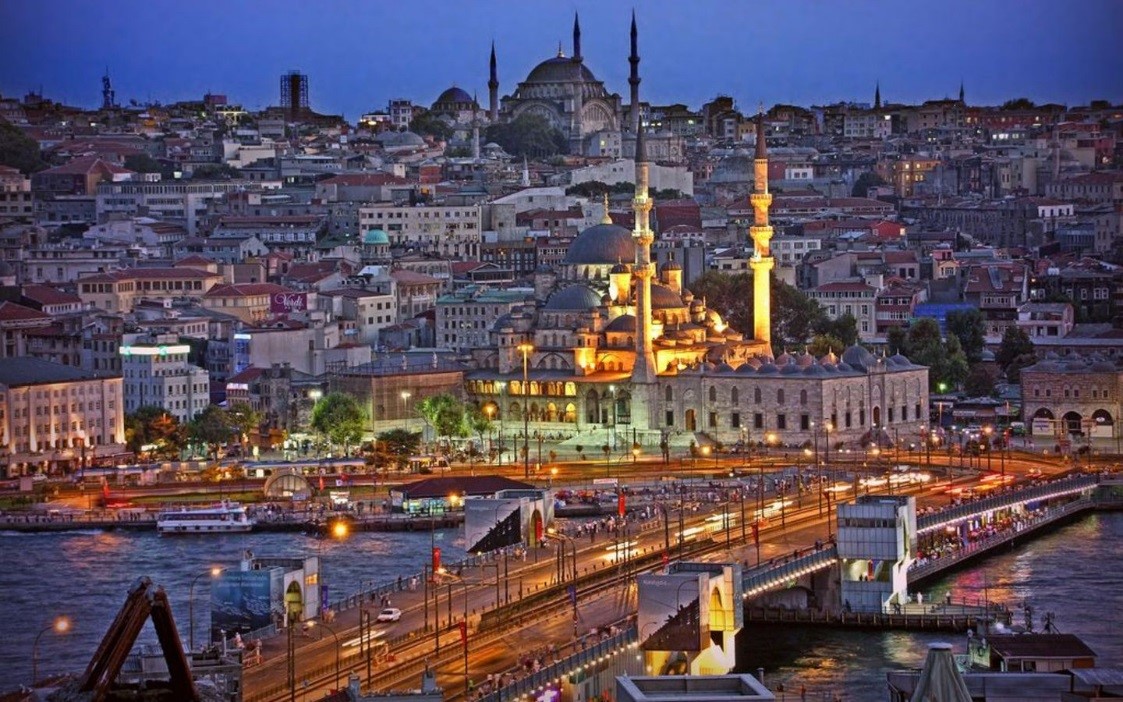
Istanbul
Turkey's largely free-market economy is increasingly driven by its industry and service sectors, although its traditional agriculture sector still accounts for about 25% of employment. An aggressive privatization program has reduced state involvement in basic industry, banking, transport, and communication, and an emerging cadre of middle-class entrepreneurs is adding dynamism to the economy and expanding production beyond the traditional textiles and clothing sectors. The automotive, construction, and electronics industries are rising in importance and have surpassed textiles within Turkey's export mix. Oil began to flow through the Baku-Tbilisi-Ceyhan pipeline in May 2006, marking a major milestone that will bring up to 1 million barrels per day from the Caspian to market. Several gas pipelines projects also are moving forward to help transport Central Asian gas to Europe through Turkey, which over the long term will help address Turkey's dependence on imported oil and gas to meet 97% of its energy needs. After Turkey experienced a severe financial crisis in 2001, Ankara adopted financial and fiscal reforms as part of an IMF program. The reforms strengthened the country's economic fundamentals and ushered in an era of strong growth averaging more than 6% annually until 2008. Global economic conditions and tighter fiscal policy caused GDP to contract in 2009, but Turkey's well-regulated financial markets and banking system helped the country weather the global financial crisis and GDP rebounded strongly to around 9% in 2010-11, as exports returned to normal levels following the recession. Growth dropped to roughly 3-4% in 2012-13. Turkey's public sector debt to GDP ratio has fallen below 40%, and two rating agencies upgraded Turkey's debt to investment grade in 2012 and 2013. Turkey remains dependent on often volatile, short-term investment to finance its large current account deficit. The stock value of FDI reached nearly $195 billion at year-end 2013, reflecting Turkey's robust growth even in the face of economic turmoil in Europe, the source of much of Turkey's FDI. Turkey's relatively high current account deficit, domestic political uncertainty, and turmoil within Turkey's neighborhood leave the economy vulnerable to destabilizing shifts in investor confidence.

